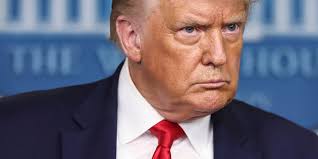In that brilliant 1964 film “Dr Strangelove, or how I learned to stop worrying and love the Bomb”, the US accidently launches a squadron of B-52 bombers with thermonuclear (hydrogen) bombs against the USSR. A bumbling delusionary President, with borderline mental health issues (Peter Sellers), surrounded by war crazy generals and a mad German nuclear scientist, struggles to manage the crisis.
Re-watching this great anti-war film, I kept thinking about President Trump and how the World has survived over the past three and a half years. Had the US voters entrusted the nuclear button to a delusionary figure with a limited grasp of the truth? Does Trump actually mimic the exaggerated characters in Dr Strangelove, or is it my imagination? Does Trump echo the manic machismo of General Buck Turgidson (George C. Scott), or is he the health fanatic, General Jack D. Ripper, calmly explaining the dangers of water fluoridation while his troops are locked in mortal combat all around him? Or is Trump the openly racist, Dr Strangelove, trying to contain his exuberance at the imminent Apocalypse.
As Trump might say, “Great guys, great guys!”.
Suddenly we realise that all those “great guys” that originally entered the White House with him in January 2017, are all gone. Like contestants in his reality TV shows they were fired, many at the whim of the Ringmaster. Several were former senior military officers who were trying to talk some sense into the man, at least on military matters.
With less than 90 days to go, opinion polls show President Trump’s re-election chances are in trouble. His handling of the Covid-19 pandemic and its economic consequences may yet prove his downfall. Efforts to deflect the blame towards China, the World Health Organisation and even towards his own medical team, have not gained traction.
It was not supposed to be like this. At the beginning of this year he was quite far advanced in implementing his 2016 and current election promises. He had lowered the corporate tax rate and delivered on huge tax cuts for working Americans. He had greatly reduced the number of US forces serving overseas. He had withdrawn from the Paris Climate Agreement and raised tariffs against countries with unfavourable trade balances with the US. He had moved the US Embassy from Tel Aviv to Jerusalem and, as promised, “Explicative bombed ISIS into oblivion”.
The Wall with Mexico is far from finished but is sufficiently advanced to have become a tourist attraction, and a place of pilgrimage for die-hard Trump supporters.
However, top of his 2016 election promises was to force European nations to pay their fair share for European security. This has not happened, not remotely. In fact, the gap in Defence spending between the US and Europe, from 2016 to 2020(estimated) remains unchanged. While some of the smaller NATO member nations have increased their defence spending to the agreed NATO target of 2% of GDP, ahead of the 2024 deadline, Germany has resisted Trump’s pressure and will only reach 1.4% by the agreed date.
To vent his anger at Chancellor Merkel, Trump decided last month to withdraw 12,000 US troops from Germany in September, reducing the US presence there to 24,000. Merkel was neither impressed nor intimidated.
So, what is the actual position and why was Trump so determined to lift the burden of paying for European defence spending from the US taxpayer?
First, the gap in defence spending is enormous. The US currently spends approximately 3.6% of its GDP on defence, as against a European average of 1.4%. Secondly, the US has to upgrade its military capabilities to meet long term challenges in Asia. Thirdly, the US justifiably expects Europe to look after its own security, contain the threat of Russia restoring its influence over Eastern Europe, and take the lead in confronting security and economic problems in Africa.
None of this is possible within the time remaining. There is only one card left to play, a card which would be highly popular among his core supporters. This would be to suspend the US commitment to the mutual defence clause, Art 5, of the Washington Treaty (1949), in respect of defaulting NATO countries, with the main target being Germany.
Article 5 has always been regarded as sacrosanct by all NATO countries. At the heart of this, is the assurance that the US will defend any NATO country that is attacked. Suspending that assurance would have strategic consequences, in particular for non-nuclear Germany, and upset the balance of power in central Europe in favour of Russia.
The question is, how far is Trump prepared to go to get re-elected?
Perhaps some distance. After all, Trump is already tramping over other international treaties, why not on the Washington Treaty as well?
Colonel Dorcha Lee


